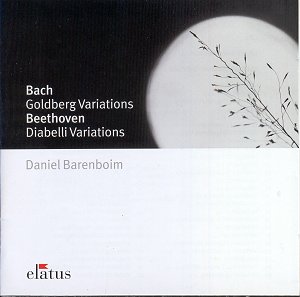Daniel
Barenboim presents here a unique coupling of works in a 2-CD set:
Bach's Goldberg Variations and Beethoven's Diabelli Variations.
Each of these works is, in a way, an emblem of a certain period
and certain style of music. While both are variations, they approach
the basic material differently. Beethoven presents a series of
variations on Diabelli's waltz, focusing on various characteristics:
"its harmony, or its melody, or even a seemingly insignificant
detail, like the quick blur of a grace note with which it begins."
Bach, on the other hand, builds his variations around a 14-measure
bass line; thematically, the variations have little to no relationship.
Daniel
Barenboim is a consummate pianist, though he is now known more
for his conducting. His recording of the Goldbergs is both personal
and sensitive, and he plays this work with a focus very different
from your average baroque performer. Differently by the instrument,
naturally, but also by his use of legato and phrasing, which is
far more romantic than baroque. But he never loses sight of the
original tone of this music, and at times his playing is breathtaking.
The opening aria shows a great appreciation for the depth of Bach's
music, but his playing can be a bit heavy-handed at times, such
as in the tenth variation, where he eschews the legato he used
so much in the initial variations and plays a hammering staccato,
the left hand overwhelming the right. Barenboim is at his best
in the slower, more sinuous variations, such as the 15th, with
its subtle counterpoint and regular rhythm. His performance of
the 25th variation is nearly perfect - he plays this at a slow
tempo, over ten and a half minutes long, with subtle phrasing
and dynamics that bring out the magnificence of this masterpiece.
Barenboim
gives the same energy to his performance of the Diabelli variations,
but goes even further, with more energy, more force. Part of this
is the nature of the music itself, but also perhaps he feels more
in touch with Beethoven than Bach. He has recorded a great deal
of Beethoven's music - including two complete sets of the piano
sonatas - and very little Bach. There is a feeling of mastery
in this work, as Barenboim shifts his tone and style according
to the type of variation, and this results in a brilliant interpretation.
Note
that this set contains copy-protected discs, even though they
are not labelled as such; these discs may not play correctly in
certain CD players, especially portable and car players.
This
excellent set gives the best of two worlds: Bach and Beethoven.
Daniel Barenboim's interpretations of these two variation sets
are very good, even though he is more at home with the Beethoven
than the Bach. The budget price, and the unique idea of having
the two works in one set, make this a recommendable purchase.
Kirk
McElhearn
